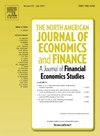Tail risk spillover and systemic importance among fossil energy markets: Evidence from china
IF 3.8
3区 经济学
Q1 BUSINESS, FINANCE
North American Journal of Economics and Finance
Pub Date : 2025-05-23
DOI:10.1016/j.najef.2025.102461
引用次数: 0
Abstract
Understanding how risks are transferred between fossil energy markets is essential to promoting China’s sustainable growth as climate change and the energy transition shake these markets. This study uses the CoVaR approach to build a tail risk network with a focus on the fossil energy industry in China. We then use the PageRank algorithm to determine which institutions and industries within this network are systemically important. Furthermore, we look into how exogenous shocks from extreme occurrences can dynamically transmit tail risk spillovers in the market. The empirical results show that risk spillovers within China’s fossil fuel system vary over time. This study provides new insights into fossil energy markets that can assist investors in spreading investment risks and regulators in creating effective policies by examining the various risk transmission mechanisms among fossil energy markets of three crises: the COVID-19 pandemic, the Sino-US trade war, and the Russia–Ukraine conflict.
化石能源市场尾部风险溢出与系统性重要性:来自中国的证据
在气候变化和能源转型撼动化石能源市场之际,了解风险如何在化石能源市场之间转移,对于促进中国的可持续增长至关重要。本研究以中国化石能源行业为研究对象,采用CoVaR方法构建尾部风险网络。然后,我们使用PageRank算法来确定该网络中的哪些机构和行业具有系统重要性。此外,我们还研究了极端事件的外生冲击如何动态地传递市场中的尾部风险溢出效应。实证结果表明,中国化石燃料系统内部的风险溢出随时间的变化而变化。本研究通过考察新冠肺炎大流行、中美贸易战和俄乌冲突三次危机中化石能源市场的各种风险传导机制,为化石能源市场提供了新的见解,有助于投资者分散投资风险,帮助监管机构制定有效政策。
本文章由计算机程序翻译,如有差异,请以英文原文为准。
求助全文
约1分钟内获得全文
求助全文
来源期刊
CiteScore
7.30
自引率
8.30%
发文量
168
期刊介绍:
The focus of the North-American Journal of Economics and Finance is on the economics of integration of goods, services, financial markets, at both regional and global levels with the role of economic policy in that process playing an important role. Both theoretical and empirical papers are welcome. Empirical and policy-related papers that rely on data and the experiences of countries outside North America are also welcome. Papers should offer concrete lessons about the ongoing process of globalization, or policy implications about how governments, domestic or international institutions, can improve the coordination of their activities. Empirical analysis should be capable of replication. Authors of accepted papers will be encouraged to supply data and computer programs.

 求助内容:
求助内容: 应助结果提醒方式:
应助结果提醒方式:


